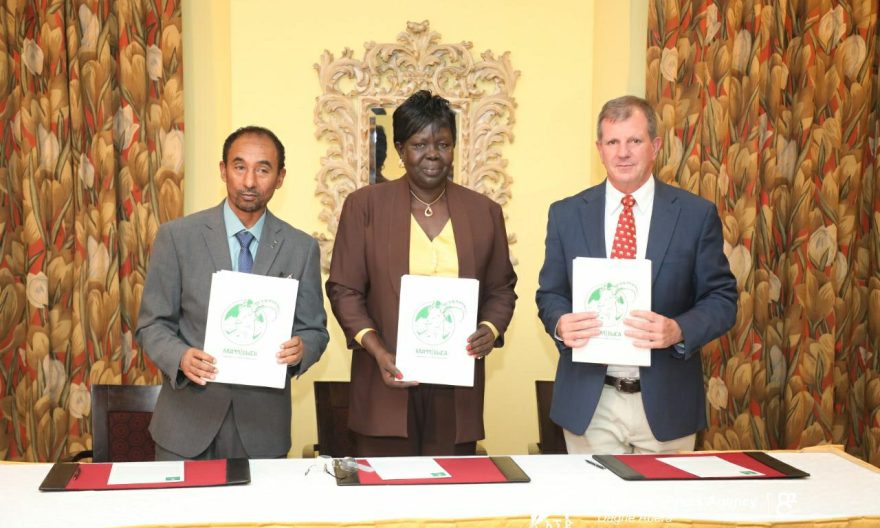
Gambella National Park, Ethiopia’s largest national park is located near the border with South Sudan. Established in 2003, the park covers approximately 5,061 square kilometers and is known for its diverse ecosystems, including wetlands, savannahs, and woods.
The park is home to a wide range of animals, including large mammals like elephants, buffaloes, and various antelope species, making it rich in biodiversity. It is also a haven for birdwatchers due to its variety of bird species. In addition to its wetland ecosystem, the park is recognized for key wetland areas that support wildlife and local populations, providing habitats for a variety of aquatic animals critical to the region’s ecology.
Many tourists are drawn to the park to experience the local lifestyle. The Gambella region is inhabited by different ethnic groups, such as the Anuak and Nuer people, each with its unique customs and cultural heritage, making the park an integral part of the surrounding landscape and culture.
Despite its potential, the park faces conservation challenges like habitat deterioration, poaching, and agricultural pressures. Conservation efforts are necessary to preserve its unique biodiversity.
While tourism in Gambella National Park is not as developed as in other Ethiopian parks, it has great potential due to its diverse fauna and scenic landscapes. Protecting the park and promoting sustainable tourism can benefit both conservation efforts and local communities.
However, a variety of challenges have hampered its tourism potential. Therefore, it is important to address these challenges in order to fully realize the park’s potential as a tourist destination.
In order to address the challenges, the Ethiopian Wildlife Conservation Authority, Gambella Peoples’ Regional State, and African Parks have entered into a Collaborative Management Partnership. This landmark agreement aims to preserve the park’s biodiversity, promote sustainable development, and address climate change and environmental degradation.
The Gambella People’s Regional State Chief Administrator, Alemitu Umod, stated, “This collaboration is a historic step in protecting one of Ethiopia’s most priceless natural resources.” She stressed that in addition to creating much-needed jobs and promoting socioeconomic development in the area, the agreement will safeguard the park’s ecology.
Gambella National Park is well known for its abundant biodiversity, which includes vital ecosystems and endangered species. It is home to recognizable animals and covers enormous wetlands, grasslands, and forests. Therefore, protecting the park is essential to preserving Ethiopia’s natural heritage and reducing the effects of climate change, she said.
Alemitu Umod believes that the state’s vast natural potential has been underutilized owing to a variety of challenges. Hence, she welcomed the collaboration arrangement as a golden chance for cooperatively conserving parks and helping the local community.
However, the conflicts in the area and the migration from South Sudan pose challenges to wildlife conservation. To address these issues, the Gambella State government is working closely with stakeholders on both sides. She also expressed her trust that African Parks, an international conservation organization with extensive experience in managing protected areas, brings technical expertise and funding to the park.
African Parks Chief Executive Officer (CEO), Peter Fearnhead, stated, “We are truly excited to embark on this journey with our Ethiopian partners.” He continued, “This agreement marks a new chapter in Gambella National Park’s sustainable management, protecting it for future generations while empowering local communities.”
Furthermore, the partnership is critical for advancing the state’s ecosystem and establishing a comprehensive and integrated management system. He assured African Park’s commitment to providing essential support for Gambella National Park’s development.
Fearnhead also praised Ethiopia’s continuous efforts in tourism development, animal conservation, and forestry projects. He stated that the deal would play an important role in providing socioeconomic benefits for communities on both sides of the border.
Ethiopian Wildlife Conservation Authority Director General, Kumara Wakjira, shared a similar sentiment. He said, “This is not just about protecting a remarkable ecosystem but about unlocking its full potential to benefit communities and support national development goals.”
More importantly, he said, the deal is in line with Prime Minister Abiy Ahmed’s Green Legacy Initiative in Ethiopia. By improving the park’s infrastructure and visibility, the agreement seeks to increase ecotourism in addition to conservation. It is anticipated that this will draw tourists from both local and foreign countries, bringing in money and supporting ecotourism for the advancement of the country.
“The agreement is vital in addressing gaps in wildlife management, conservation skills, and knowledge, particularly through African Parks’ expertise,” he added. He also stated that the government is collaborating closely with private sector partners, local communities, and other stakeholders to achieve sustainable development, wildlife conservation, and environmental preservation goals.
Ethiopian Ministry of Tourism Minister, Selamawit Kassa, noted, “By investing in our natural heritage, we are also investing in our future.”
She added that the agreement aims to ensure sustainable wildlife conservation and create a conducive environment for joint efforts in ecological preservation. Hence, it is important to put a collaborative effort to sustain environmentally friendly and sustainable development for Gambella National Park.
The Minister added that the collaboration is important for protecting forests, wildlife, and ecosystems as well as for fostering an environment that would benefit future generations. She also praised Ethiopia’s continued efforts, led by Prime Minister Abiy Ahmed (PhD), to ensure food security, boost tourism, and combat climate change.
“The corridor development will soon be implemented to transform Gambella, generate jobs, and attract more tourists to the area,” Selamawit said. She also noted the importance of the agreement for the Gambella communities and neighboring South Sudan.
Indeed, Gambella National Park is a significant natural and cultural legacy of Ethiopia. It benefits the country’s natural heritage and provides chances for conservation and responsible tourism. As a result, all stakeholders must step up their efforts to close gaps and improve animal protection in Gambella National Park and its adjacent areas.
BY EPHREM ANDARGACHEW
The Ethiopian Herald December 15/2014




